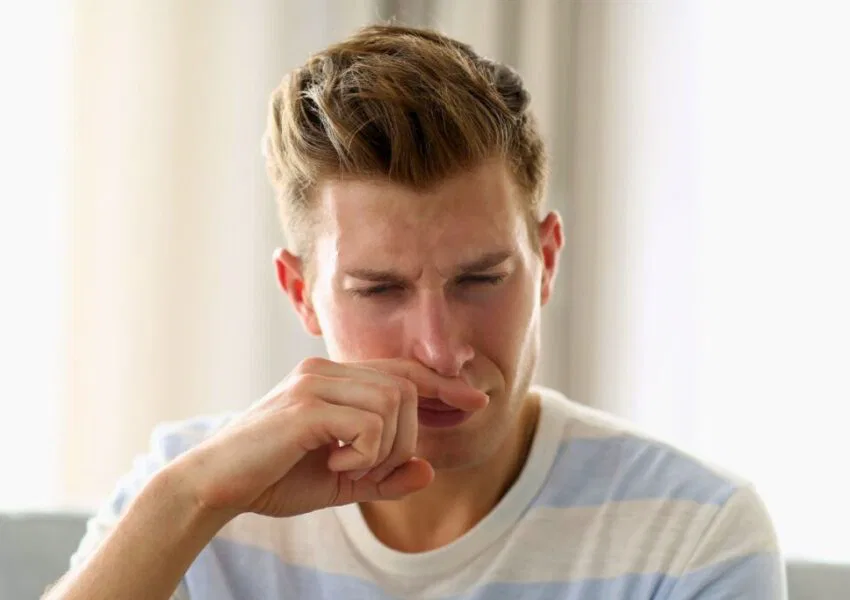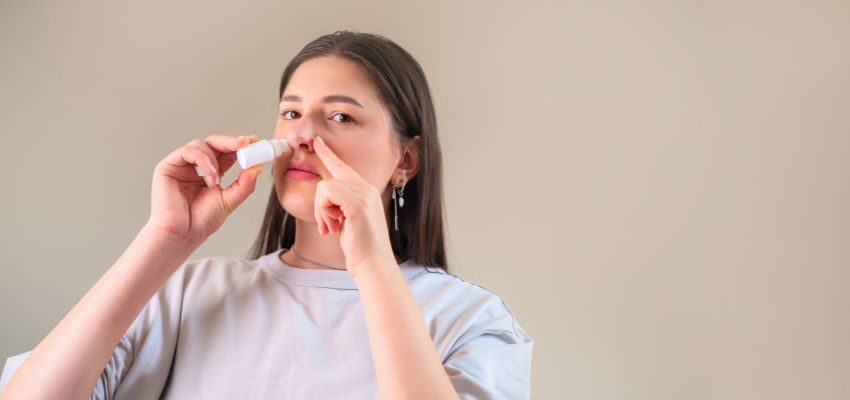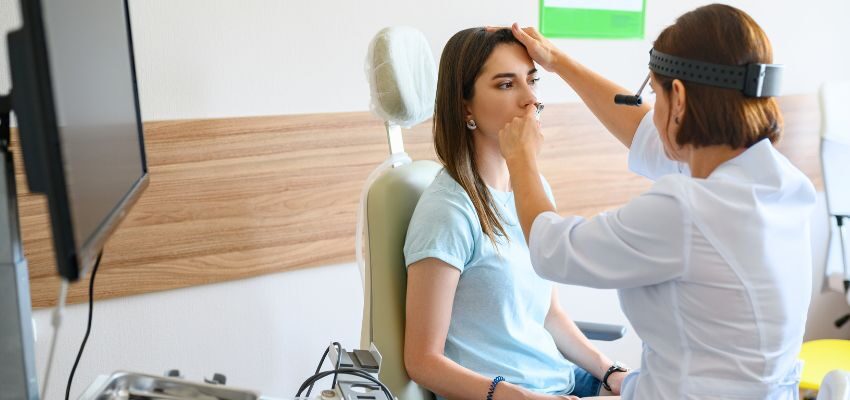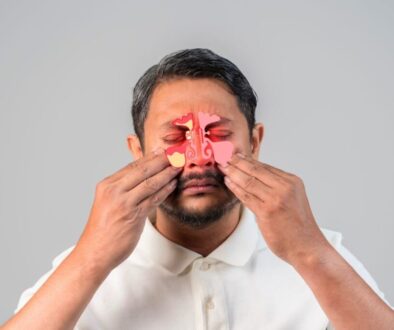The Truth Behind A Bad Smell In The Nose: Causes & Treatments

Published April 29, 2025
Do you keep noticing a bad smell in your nose that just won’t go away? It can be frustrating, distracting, and even a little worrying. You’re not alone. This strange sensation is more common than you might think. A bad smell in nose can signal underlying issues like a sinus infection or poor oral hygiene. The good news? Most causes are temporary and can be addressed with the proper care.
In this article, we’ll explore the causes of bad smell in nose, discuss effective treatments, and learn practical tips to prevent this issue once and for all.
What It Means When You Notice A Strange Smell
Our noses detect countless scents every day. But a strange smell inside your nose could point to a health issue. Infections, blockages, or certain habits might cause it. These odors often signal a problem with nasal or oral health.
So, should you be worried? If the odor is intense, persistent, or accompanied by symptoms like nasal discharge or facial pain, it’s advisable to seek medical advice. Mild or short-lasting odors are usually not severe. They can often be fixed with simple home remedies or small routine changes.

Common Causes Of Bad Smell In Nose
Have you ever noticed an unpleasant smell and realized it’s coming from your nose? Let’s explore the most common reasons behind these bothersome nasal odors and uncover why they occur.
Sinus Infection (Sinusitis)
Sinusitis happens when sinus tissues become inflamed. This causes nasal congestion and mucus buildup. This trapped mucus can harbor bacteria, leading to a foul-smelling nasal discharge. While acute sinusitis typically clears up within a few weeks, chronic sinusitis can persist for over eight weeks. Common culprits include bacteria, viruses, and occasionally fungi.
Key symptoms:
- Yellow or green nasal discharge
- Facial pressure around the eyes, cheeks, or forehead
- Diminished or complete loss of taste and smell
Dental Issues And Oral Hygiene
Dental problems like cavities, gum disease, and plaque can cause unpleasant odors. These issues release sulfuric gases that reach the nasal passages. Poor oral hygiene allows bacteria to grow, affecting both the mouth and nasal cavities.
Common symptoms:
- Persistent bad breath
- Tooth pain or swollen, inflamed gums
Smoking And Tobacco Use
Smoking harms oral health by increasing the risk of gum disease, tooth discoloration, and oral cancer. It also reduces the senses of taste and smell, making it harder to enjoy food. Smoking causes odors on the breath, nose, and clothing. These smells can be unpleasant for both smokers and those nearby. Over time, these effects can seriously impact quality of life.
Dry Mouth (Xerostomia)
Saliva is crucial in keeping the mouth clean by removing food particles and bacteria. When saliva production drops, odors can intensify. This can happen due to dehydration, certain medications, or mouth breathing. The result is much more noticeable odors.
Foods, Beverages, And Medications
Strong-smelling foods like garlic, onions, and spicy dishes can leave lasting odors in the mouth and nasal passages. Certain medications, like antibiotics and antihistamines, can also cause dry mouth, which may make the problem worse.
Nasal Polyps
Nasal polyps are soft, noncancerous growths in the nasal passages or sinuses caused by chronic inflammation. A common symptom is a persistent foul odor, often described as rotten, due to fluid buildup in the polyps, which thrive in the damp mucous membranes.
Nasal polyps can also cause congestion, a reduced sense of smell, and headaches. As they grow or multiply, they may block nasal passages, worsening congestion and odor. Treatment often includes corticosteroids to reduce inflammation, with surgery needed in severe cases to restore normal function.
Phantosmia (Olfactory Hallucinations)
Phantosmia refers to the perception of smells that aren’t there. This unusual phenomenon can stem from various causes, including sinus infections, migraines, or neurological conditions such as Parkinson’s disease and Alzheimer’s. The phantom scents are often described as metallic, burnt, or rotten, creating an experience that’s both perplexing and unsettling.
Digestive And Systemic Conditions
Digestive issues, such as acid reflux, can lead to unpleasant odors in the throat and nose. In rare cases, systemic conditions like diabetes or kidney disease may produce distinctive scents, such as sweet or ammonia-like odors.
Treating And Preventing Unpleasant Nasal Odors
Effective treatment begins with targeting the underlying cause of the odor. The following strategies have been shown to deliver results:
Remedies For Mild Cases
- Saltwater rinse. A simple saline solution can help flush out mucus and bacteria from your nasal passages, reducing unpleasant odors. Combine one teaspoon of salt with a pinch of baking soda in warm water to produce an effective nasal rinse.
- Stay hydrated. Proper hydration supports saliva production, which combats dry mouth and helps eliminate trapped particles that cause bad smells. Drink plenty of water throughout the day to stay refreshed.
- Steam inhalation. Inhaling steam aids in loosening mucus and clearing nasal passages, relieving congestion and unpleasant odors. It’s a soothing and effective way to breathe easier.
- Maintain good oral hygiene. Brush your teeth at least two times daily for two minutes, floss regularly, and use a tongue scraper to remove bacteria. If you wear dentures or appliances, clean them thoroughly to prevent bacterial buildup.
- Use a humidifier. Use a humidifier to introduce moisture to the air. Doing so prevents your nasal passages from drying out and lessens discomfort while minimizing unpleasant odors. Keep your environment comfortably humid for better overall relief.
Medical Treatments For Severe Or Chronic Cases
- Medications. Doctors may recommend nasal corticosteroid sprays, antibiotics, or antihistamines to address infections or inflammation.
- Surgery. Corrective surgery may be necessary for severe nasal blockages caused by polyps or structural abnormalities.
Lifestyle Tips For Prevention
- Stay hydrated by reducing your intake of dehydrating beverages like coffee and alcohol.
- Quit smoking and moderate your consumption of garlic or spicy foods if persistent odors are a concern.
- Schedule routine dental check-ups to maintain oral health and prevent related problems.
- Manage allergies and sinus inflammation to lower the risk of recurring infections.
The Role Of Probiotics In Nasal Health
Probiotics are beneficial microorganisms that keep bacteria in our bodies balanced. They’re gaining attention for their role in oral and nasal health. Studies show probiotics can fight bacteria that cause bad breath. They may also ease sinus discomfort and promote healthier nasal passages.
Selecting The Right Probiotic
Choose probiotics with strains that support upper respiratory health. BLIS K12 (Streptococcus salivarius K12) and BL-04 (Bifidobacterium Lactis BL-04) are great examples. They help reduce bad breath and boost the immune system. Adding a quality probiotic to your routine fights odors and improves overall well-being.
Bionaze is a probiotic designed for oral and nasal health. It combines clinically studied strains to deliver targeted benefits. Adding Bionaze to your routine can reduce odors and support overall well-being.
Frequently Asked Questions
Can a sinus infection cause a foul odor in the nose?
Yes, sinus infections can produce foul-smelling discharge due to the buildup of bacteria in the mucus.
When should I be concerned about nasal odor?
If the odor lasts for weeks or worsens, consult a healthcare professional. Seek help with symptoms like fever, swelling, or severe congestion.
Do probiotics help with nasal issues?
Probiotics support nasal and oral health. They help maintain healthy bacteria levels. They can reduce bad breath and manage sinus inflammation.
What home remedies can reduce unpleasant nasal odors?
Saltwater rinses, staying hydrated, and good oral hygiene can help. These simple remedies effectively eliminate mild nasal odors.

Why Choose Bionaze?
Bionaze is a trusted solution for promoting nasal and oral health. Formulated with potent probiotic strains like BLIS K12 ((Streptococcus salivarius K12) and BL-04 (Bifidobacterium Lactis BL-04), it helps maintain a healthy balance of bacteria in the sinuses, ears, and throat.
This unique blend combats bad odors caused by infections or dry mouth and bolsters the immune system to support long-term respiratory health. Safe, effective, and easy to use, Bionaze is the wise, convenient choice for a fresher, healthier nasal and oral environment.
Freshen Your Life By Tackling Bad Smell In Nose
Dealing with a bad smell in nose can be unpleasant, but understanding its causes and addressing them promptly makes it manageable. Most cases can be treated or even prevented with simple lifestyle changes, whether it’s due to sinus infections, dry mouth, or other factors. Incorporating probiotics and staying hydrated can provide additional support. If the foul smell in your nose persists, consulting a medical professional is a smart step. Take action today to protect your nasal health and overall well-being.
Take charge of your nasal health today by adding Bionaze to your daily wellness routine!
Benefit From The Latest Advancements In Probiotic Science With Bionaze
Bionaze is a proprietary blend of probiotics proven to promote ear, nose, and throat health, improve digestion, and support your immune system. The active ingredients BLIS K12, and BL-04 are considered among the best probiotics according to science.
Get 25% Off Your First Order when you use BIO25 at checkout!

This Content Has Been Reviewed For Factual Accuracy
This content has undergone thorough fact-checking by our team of internal experts. Learn more about the meticulous editorial standard for our website here.
ADVERTISEMENT

About The Author
Hi, I’m Corinne Grace, a proud nursing graduate from Riverside College with a flair for writing. I specialize in health and wellness topics, using my educational background to weave informative and attention-grabbing articles that appeal to a wide variety of readers. Committed to excellence in writing, I’m always refining my skills to stay in sync with the fast-evolving world of digital media. Whether you’re seeking to understand complex health concepts or looking for relatable advice, I’m here to deliver content that’s accurate and enjoyable to read.




